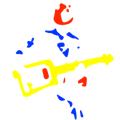“You’re never too old to learn” said Fred,
“You can’t teach on old dog new tricks” replied George.
Well they can’t both be right, or can they? Of course as children we were sponges, everything was new and learning was as natural as eating and sleeping. What happens as we get older? Is it different for some than others? Is there something about getting older that makes it harder to learn, or at least different?
Generally people answer questions like this from their own experience, fair enough, the problem is that your experience will be different to mine and to Fred’s and to George’s. That’s why researchers look for more objective data, or at least the subjective data from lots of people, and look for patterns. Here’s a brief summary of what they’ve found.
Your brain is simply a bunch of nerve cells all clumped together in a soft gelatinous blob. Nerve cells don’t do much, they don’t produce anything, kill germs, stuff like that, all they do is transmit electro-chemical signals to other nerve cells. If a transmission happens often enough then the link between the two cells becomes stronger and future transmissions happen much easier. We talk about the cells being ‘connected’.
When enough nerve cells are connected we create a pathway for this electro-chemical signal. When the pathway is well established through repetition, we’ve learned something. Sometimes these connections happen only in the brain and we’ve developed our memory or deeper understanding of something. Sometimes it happens out in the frontiers, the nerves in your spine and limbs, and you’ve learned a new movement, sometimes called a motor skill. Both of these things are important for musicians.
How about our original quandary, old dogs, new tricks etc. I’ll do my best to summarise a literature review that deals with this very question. If you’re interested you can read the whole thing here http://www.ncbi.nlm.nih.gov/pmc/articles/PMC2838968/
A literature review is like a summary of all the research in a particular area. These guys read the research and came up with a few key points.
- The brains in older people are smaller than those in young adults and the reduction correlates with reduced motor performance.
- Areas of the brain that deal with motor performance become less efficient with age.
Motor performance is simply your ability to move and learn new movements.
They also found however that all is not lost:
“Although it takes more training time, older adults can eventually perform tasks automatically at the same level as their younger counterparts.”
Our brains will change when they need to. When one part of the brain becomes less capable, another part will take over, it’s called plasticity. They also found that:
“many studies have reported deficits in older adults simultaneously performing cognitive and motor tasks”
and
”older adults learn a new task faster if they previously learn multiple other motor tasks”
So performing these motor tasks is harder if the brain is busy doing something else and we’ll find it easier once we’ve practiced learning other motor skills.
And here lies the essence of learning new skills, particularly if we didn’t have the opportunity to learn them as children.
Learn one thing at a time.
When you repeat one simple task that is very similar to something that you already know it’s much easier to create these connections between nerve cells. Once these are established you can go go on and learn another that is similar again, then another, then you combine them, one step at a time. Eventually it comes together.
Not rocket science, or even neuroscience. Makes perfect sense but it’s how you do it that is the trick. What do you learn? When do you know you’ve learned it? What do you learn next? How do you break up these complex movements? How do you construct a set of skills?
I’m not giving it all away here, and there’s too much for a newsletter anyway. It’s all in my Starter Pack course though. The next one will be about how to practice effectively.
Patrick Curley B. Cont. Music / B. Ed. B. Hlth Sc.
